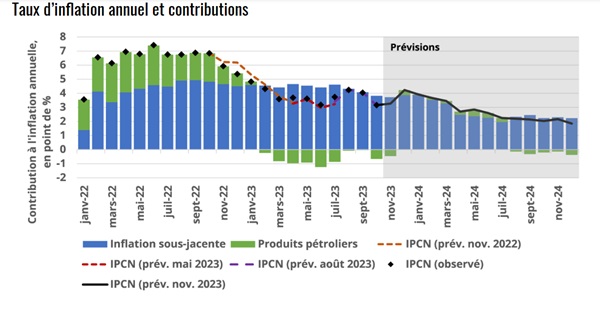 Annual inflation rate and contributions;
Credit: STATEC
Annual inflation rate and contributions;
Credit: STATEC
The national statistics institute STATEC has published a report in which it announced its Luxembourg inflation forecast of 3.8% in 2023 and 2.6% in 2024.
Over one year, the inflation rate has halved, while within a year, the medium-term inflation target of 2% set by the European Central Bank was once again reached in Luxembourg. Annual inflation is expected to reach 3.8% in 2023 and 2.6% in 2024. The next wage indexation is planned for the third quarter of 2024.
In October 2023, annual inflation in Luxembourg reached its lowest level in two years, at 3.2%, STATEC noted. Behind this apparent slowdown, oil prices and underlying inflation are following opposite trends. Since February, petroleum products have helped to bring down the general inflation rate, notably via negative base effects. The price of Brent crude oil has nevertheless risen since this summer. Petroleum products should therefore once again contribute to the increase in annual inflation in the first half of 2024.
Underlying inflation (excluding oil products), for its part, has slowed for four months and stood at 4.2% in October (compared to 4.9% in July). According to STATEC, this mainly results from a limit on the surge in food prices to 7.5% year-on-year in October (compared to 11.5% during the peak in March) and a slowdown in the prices of non-energy industrial goods, with +3.3% year-on-year in October (after a peak of 6.4% last January). Similar trends have been seen across the eurozone where core inflation (excluding energy and food) also fell to 4.3% in September (compared to 5.3% in August).
Prices of services nevertheless continued to rise. The three wage indexations paid in February, April and September 2023 fuelled the prices of services which reached their highest annual inflation in 2023 with 3.7% in October (contributing 1.7% points to general inflation). The free provision of certain services, however, limited inflation in Luxembourg, which remains lower than that of the eurozone where the prices of services had increased earlier and are now starting to slow down (4.7% in September compared to 5.5% in August). According to current forecasts, inflation in the eurozone will reach 5.6% in 2023 and 2.0% in 2024.
STATEC added that speculation around the potential impact of the conflict between Hamas militants in Gaza and Israel has pushed global energy prices higher. Nevertheless, compared to the historically high levels of 2022, European energy markets continue to be relatively relaxed. Developments will also depend on demand for gas (in the context of Russian aggression against Ukraine) as winter approaches.
Based on the recent evolution of energy prices and supply in Luxembourg, households could benefit from gas prices lower than the price currently capped at €0.83 / m3 at the beginning of next year.
STATEC thus revised underlying inflation slightly downwards to 4.5% in 2023 and 2.7% in 2024 (compared to 4.8% and 2.9% previously). However, considering also potential increases in Brent crude oil, STATEC has forecast inflation of 3.8% for this year and 2.6% for 2024 (i.e. a marginal revision compared to the August 2023 forecasts of 3.9% and 2.5%). The next wage indexation is expected to take place in the third quarter of 2024.








